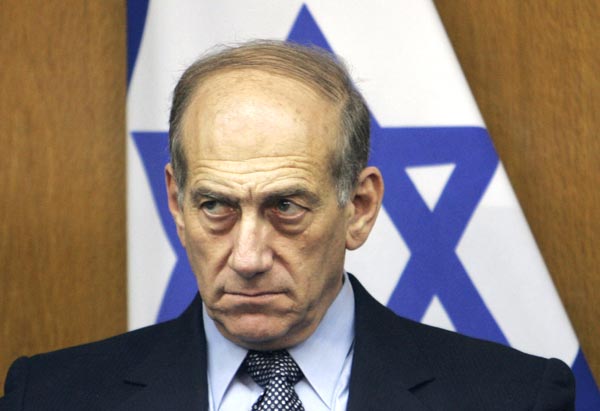TEL AVIV, (Reuters) – Israel’s ex-prime minister Ehud Olmert was sentenced to six years in jail today for taking bribes in a real estate deal, a crime the judge said was akin to treason.
The first criminal conviction of a former Israeli head of government all but ended speculation that Olmert – a centrist credited internationally with working towards a peace settlement with the Palestinians – might return to political life.
He had denied any wrongdoing in the property deal, approved when he served as Jerusalem’s mayor, that led to the construction of the hilltop Holyland apartment towers, a hulking stone complex widely seen as one of the city’s worst eyesores.
“A public servant who takes bribes is akin to a traitor,” said Judge David Rozen in the Tel Aviv District Court, as he handed down a six-year prison term sought by prosecutors and fined Olmert 1 million shekels ($289,500).
Rozen found Olmert guilty on March 31 of two bribery charges, saying the former prime minister had accepted 500,000 shekels from developers of the Holyland project and 60,000 shekels in a separate real estate deal.

Olmert, the judge said, devoted most of his time to “praise-worthy” public service – but “also lined his own pockets”.
“The accused served as the prime minister of Israel. From this high and honourable post, he reached the position of having been convicted of the most despicable and grave crimes,” Rozen said.
Rozen ordered Olmert, 68, to report to prison on Sept. 1, effectively giving his lawyers time to take the case to a higher court and request that he remain free until it rules.
Known as one of the country’s most gregarious politicians, Olmert sat largely stony-faced during the court session, and made no comment afterwards.
“He did not take a bribe. He did not receive a bribe. He sees himself as innocent, and it is with those feelings that he will be going to the Supreme Court to appeal,” Olmert lawyer Eli Zohar told reporters.
Two years ago, Olmert was acquitted of most of the major charges brought against him in separate cases involving his links to a U.S. businessman.
Those corruption allegations forced Olmert’s resignation as prime minister in 2008, and his acquittal had appeared to position him for a possible political comeback.
NETANYAHU CRITIC
Olmert has made several criticisms of Prime Minister Benjamin Netanyahu’s policies toward the Palestinians, fuelling talk about his future political ambitions.
But the judge said Olmert’s crimes entailed “moral turpitude”, which under Israeli law would preclude him from running for public office for seven years after finishing his jail term.
A lawyer by profession, Olmert began his political career in the 1970s as a lawmaker who targeted organised crime in Israel.
He was mayor of Jerusalem from 1993 to 2003 and prime minister from 2006 to 2009, staying in office in a caretaker capacity until after an election that brought right-winger Netanyahu to power.
As Israel’s leader, Olmert waged war against militants in Lebanon in 2006 and the Gaza Strip in 2008.
He claimed significant progress in talks with the Palestinians aimed at securing a final peace deal, offering an Israeli withdrawal from much of the occupied West Bank. But no agreement was reached.
After a three-year break, U.S.-brokered negotiations resumed in July, but they were frozen last month by Netanyahu after President Mahmoud Abbas’s Palestine Liberation Organization signed a reconciliation deal with Hamas, an Islamist group that advocates Israel’s destruction.
Palestinians blamed Netanyahu for the collapse, citing Israeli settlement-building and his failure to carry out a pledged prisoner release.
Olmert was among 13 defendants in the Holyland case. Sentences handed down on Tuesday against six of the other accused ranged from three to seven years.
In 2010, a former Israeli president, Moshe Katsav, was convicted on rape charges. He is serving a seven-year sentence.
($1 = 3.4537 Israeli Shekels)
